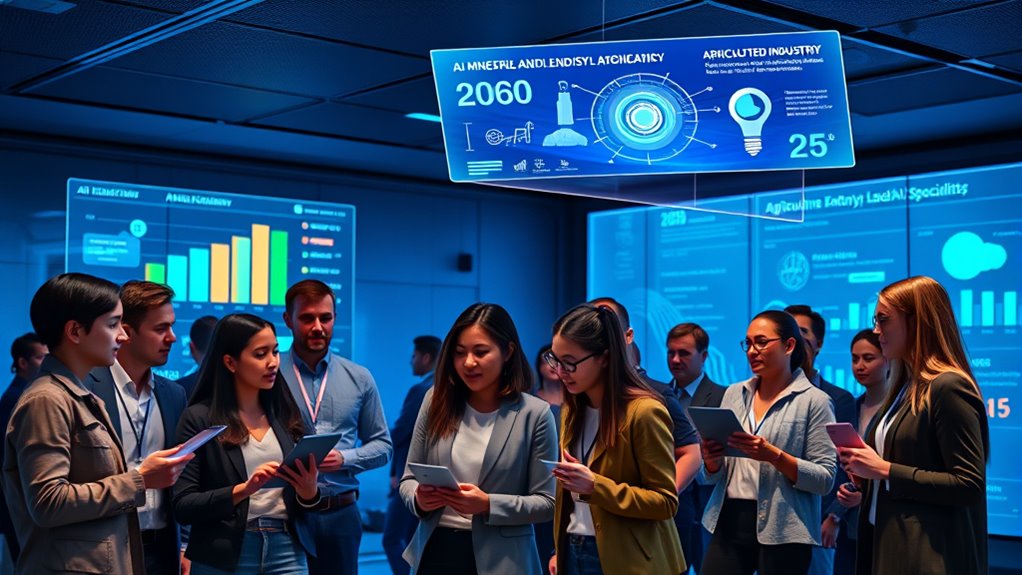In 2025, the landscape of AI talent acquisition is shifting in unexpected ways. While tech companies still compete fiercely, other industries are actively poaching entry-level AI professionals, driven by new goals and societal needs. This broader talent race could reshape entire sectors, but which ones are stepping up? Understanding the surprising players involved could change how you view the future of AI’s role across industries—and why it matters for everyone.
Key Takeaways
- Manufacturing firms are increasingly poaching AI talent to implement automation and predictive maintenance solutions.
- Educational and government sectors are recruiting entry-level AI professionals for policy and ethical standards development.
- Financial services are competing fiercely for AI expertise to enhance trading algorithms and fraud detection.
- Healthcare organizations are attracting AI newcomers to develop diagnostic tools and improve patient care.
- Non-traditional industries like manufacturing and public sector are surprising sources of AI talent in 2025.

While tech giants and startups race to secure entry-level AI talent, surprising industries are beginning to poach these skilled professionals to meet their evolving needs. As AI becomes a core driver of innovation, sectors outside the traditional tech space recognize the value of fresh AI expertise. Healthcare, for example, is increasingly hiring AI newcomers to develop algorithms that improve diagnostics and patient care. These organizations see the potential for AI to revolutionize medicine but often lack the in-house talent to lead these efforts. To attract these professionals, healthcare providers are offering competitive packages and emphasizing opportunities to make a tangible societal impact, which appeals to candidates driven by purpose.
Healthcare is increasingly hiring AI newcomers to revolutionize diagnostics and patient care through societal impact.
Financial services are also stepping into the AI talent market with greater intensity. Banks and investment firms seek AI specialists to optimize trading algorithms, enhance fraud detection, and personalize customer experiences. With these roles *vital* for maintaining competitive advantage, they’re willing to offer attractive incentives and clear career paths to retain talent. However, talent retention remains a challenge. As AI professionals are highly sought after, industries must foster environments that support ongoing learning, ethical considerations, and career growth. This is especially important considering the increasing focus on AI ethics, which guides responsible development and deployment of AI systems. Professionals want to work for organizations that prioritize ethical standards, transparency, and accountability, reducing the risk of burnout or disillusionment.
Manufacturing isn’t traditionally associated with AI, but it’s quickly becoming a surprising player in the talent race. Industry leaders are poaching AI specialists to implement automation, predictive maintenance, and quality control solutions. These innovations can drastically cut costs and improve efficiency. Yet, retaining talent in this space requires more than just competitive salaries; it demands a commitment to continuous learning and addressing AI ethics concerns. As AI becomes embedded in manufacturing processes, professionals want assurance that their work aligns with responsible practices, avoiding biases or unintended consequences that could harm workers or the environment.
Educational institutions and government agencies are beginning to recognize the importance of AI talent, too. They’re recruiting entry-level professionals to develop policies, promote AI literacy, and ensure ethical standards are upheld across sectors. For these organizations, talent retention hinges on creating stimulating environments with clear ethical guidelines and growth opportunities. They understand that fostering a sense of purpose and responsibility can help keep these professionals engaged long-term.
In all these industries, the trend is clear: AI talent isn’t confined to tech anymore. To succeed, organizations must go beyond offering competitive pay — they need to prioritize AI ethics, create meaningful work, and support ongoing development to retain these valuable professionals.
Conclusion
As AI talent shifts from tech to healthcare, finance, manufacturing, education, and government, you see industries transforming, expanding, and redefining their potential. They’re not just competing for skills; they’re shaping futures, driving innovation, and making impacts. This talent race isn’t about dollars alone; it’s about purpose, progress, and societal betterment. In this evolving landscape, you’re witnessing industries embracing change, fueling growth, and forging new paths—an exciting era of opportunity for all involved.









